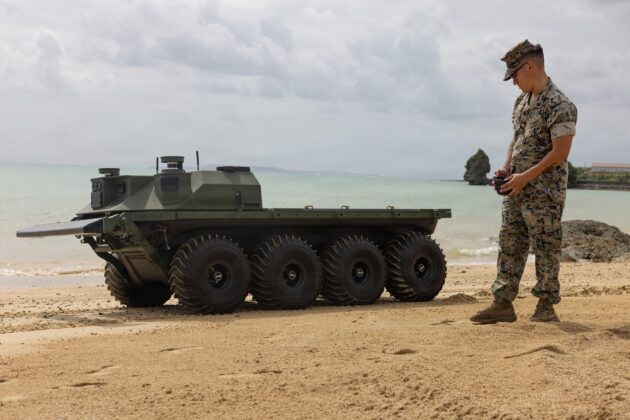
United States Marines from the 4th Marine Regiment, 3rd Marine Division, are operating Rheinmetall’s Mission Master Silent Partner autonomous ground vehicles during field operations at Camp Schwab, Okinawa, Japan, the service confirmed.
The uncrewed systems, supplied by American Rheinmetall, are being integrated into training scenarios to support a range of logistics and casualty evacuation tasks, according to the Marine Corps. The platform is part of the broader push to enhance battlefield autonomy and reduce risk to personnel during high-threat operations.
The Rheinmetall Mission Master, classified as an Autonomous Uncrewed Ground Vehicle (A-UGV), is designed for tactical transport, last-mile resupply, silent watch, and the carriage of sensors and light weapons. According to the company, the vehicle “can follow troops as a buddy, letting soldiers get closer to the enemy without being seen or heard.”
The company describes the Mission Master family as compact, low-signature vehicles that increase survivability for dismounted troops. “The system is built to support troops in dangerous missions,” Rheinmetall says, noting its ability to operate in high-risk environments with minimal operator burden. The vehicle can be programmed for autonomous pathfinding or can operate semi-autonomously in formation with infantry.
Photographs released by the Marines show the A-UGVs moving with dismounted troops through rough terrain and being used for simulated resupply and casualty evacuation drills. The vehicle’s architecture allows integration with a variety of mission modules, including stretcher mounts, cargo trays, and observation kits.
The deployment in Okinawa is part of an expanding effort by the Marine Corps and joint forces to evaluate how autonomous ground systems can complement small-unit operations in the Indo-Pacific region. The terrain and operational tempo in that area require platforms that can move quietly, carry meaningful payloads, and reduce the exposure of personnel to ambush or indirect fire.